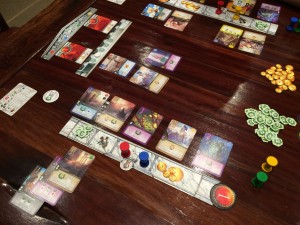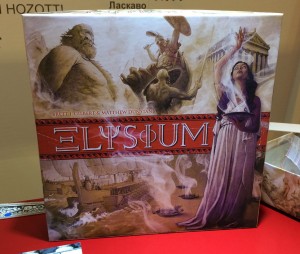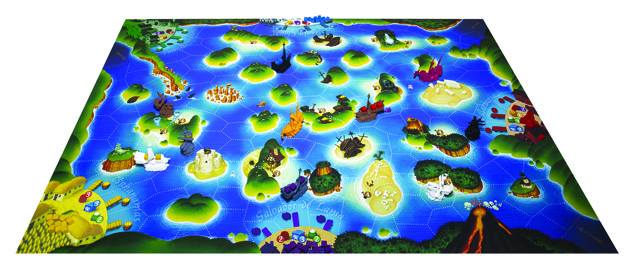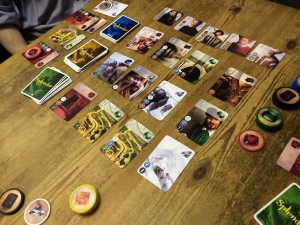Posted by James (admin) on 5th May 2015
 Elysium is Greek god themed game played over 5 rounds and the player with the most victory points (VPs) is the winner. Each round, players take turns taking either one of the god cards available that round or a turn order marker until they have had 4 turns. Each of the god cards gives its owner a benefit or ability – some abilities can be used once during the whole game, some are permanent abilities, some get used once per round, etc. When the cards are gained, they are placed in your ‘Domain’ – the area above your player board – these can be used for their abilities, but do not count towards scoring. During the game, you can move cards from your Domain to your ‘Elysium’ – the area below your player board – only in your Elysium do cards count towards scoring at the end of the game, but they can no longer be used for their abilities.
Elysium is Greek god themed game played over 5 rounds and the player with the most victory points (VPs) is the winner. Each round, players take turns taking either one of the god cards available that round or a turn order marker until they have had 4 turns. Each of the god cards gives its owner a benefit or ability – some abilities can be used once during the whole game, some are permanent abilities, some get used once per round, etc. When the cards are gained, they are placed in your ‘Domain’ – the area above your player board – these can be used for their abilities, but do not count towards scoring. During the game, you can move cards from your Domain to your ‘Elysium’ – the area below your player board – only in your Elysium do cards count towards scoring at the end of the game, but they can no longer be used for their abilities.
There are 8 sets of god cards in the game – each is a different colour and represents a specific god. Whilst the cards within each set have lots of variety, the abilities of each set of god cards have a common theme; for example, one god’s cards are about affecting other players, etc. Each game is played with 5 of the 8 sets, so this will give variety in replay, especially as 2 of the sets add extra rules too. Also, as well as the set (god/colour) it belongs to, each god card has the number 1, 2, or 3 on it too. The majority of VPs usually come from sets of god cards in your Elysium – either sets of the same colour but different number, or same number but different colour. Read the rest of this entry »
Tags: board game news, Board Games, board gaming, Elysium, Space Cowboys
Posted in Board Game Review, Board Games, Elysium | 2 Comments »
Posted by James (admin) on 16th October 2014
 Elysium is the next game from Space Cowboys – the relatively new publisher who released the excellent (and SdJ nominated) Splendor. Whilst at Spiel, I was fortunate to be given a behind-closed-doors preview of the game.
Elysium is the next game from Space Cowboys – the relatively new publisher who released the excellent (and SdJ nominated) Splendor. Whilst at Spiel, I was fortunate to be given a behind-closed-doors preview of the game.
Note: The photos below do not show the final version of the game but it is quite close. Also, the rules I describe are from memory of what I was told so there may be some inaccuracies, and I am having them checked to make sure. Finally, please excuse the poor lighting in the photos – this was not obvious until I reviewed them.
During Elysium players are all demi-gods, competing to be the best and earn their way into legend. The game is played over 5 rounds and the player with the most victory points (VPs) is the winner.
On the table are several god cards (number of players x 3) as well as turn order markers for the next turn too (one per player). Each round, players take turns taking one of the god cards or turn order markers until they have had 4 turns and all items have been taken.
Each of the god cards gives its owner a benefit or ability – some abilities can be used once during the whole game, some are permanent abilities, some get used once per round, etc. When the cards are gained, they are placed above your player board and these can be used for their abilities, but do not count towards scoring. (To count towards scoring at the end of the game, the cards need to be moved to below your player board and can no longer be used for their abilities – more on that later.)
Read the rest of this entry »
Tags: board game news, Board Games, board gaming, Elysium, Space Cowboys
Posted in Board Games, Preview | 4 Comments »
Posted by James (admin) on 11th August 2014
 Fresh from their SdJ nomination with Splendor, Space Cowboys are releasing the very fun-looking, pirate game of Black Fleet.
Fresh from their SdJ nomination with Splendor, Space Cowboys are releasing the very fun-looking, pirate game of Black Fleet.
The board shows a sea full of Caribbean islands and ports. Players each have a pirate ship and a merchant ship, plus there are 2 navy ships on the board too. On their turn, players play a movement card from their hand (usually only 2 cards). This states how many spaces their merchant ship, their pirate ship, and one specific navy ship can move. The ships can be moved in any order and each can perform one action during its move too.
Pirate ships not already carrying treasure can attack an opponent’s merchant ship if in a neighbouring space earning 2 dubloons and taking 1 of its cargo (plus sinking the merchant ship if it has no cargo remaining). Pirate ships carrying treasure (stolen cargo) can bury it on specific islands to earn extra dubloons. Merchant ships can deliver goods at ports that will accept for them (ports pay different amounts for different colours of goods, but don’t accept all colours). Selling goods means the merchant ship then gains a full load of goods of the colour that matches the port too. The navy ships can be moved next to opponent’s pirate ships to sink them (earning 2 dubloons too). Sunk ships may be inconvenient but they are back in play at the start of your next turn so you’re never without all your movement options. Read the rest of this entry »
Tags: Black Fleet, board game news, Board Games, board gaming, Essen, Space Cowboys, Spiel 14, Spiel 2014
Posted in Black Fleet, Board Games, Essen Spiel 14, Preview, Spiel 2014 | No Comments »
Posted by James (admin) on 22nd May 2014
 Splendor is a light, fast game of constant, small decisions. Overall, it’s a race to be the first player to score 15 Victory Points (VPs) by buying development cards using the 5 different coloured currencies (gems).
Splendor is a light, fast game of constant, small decisions. Overall, it’s a race to be the first player to score 15 Victory Points (VPs) by buying development cards using the 5 different coloured currencies (gems).
Each development card is a colour and each card shows its cost as well as how many VPs it is worth. Each card you purchase gives a permanent reduction on your future purchases; for example, a card costing 2 red gems and 3 green gems would only cost 2 red and 1 green if a player had already bought 2 green cards. As a result, players’ purchasing power increases as the game unfolds.
The game mechanic of discounting future purchases means that every card you buy is potentially useful and means each player has a slightly different view of the game because the costs of the cards on display become different for each player. Also, whilst gaining VPs is slow to start, with as players purchase the cheap (bottom row) cards usually worth no VPs, the game accelerates as players’ purchasing power increases and they can more regularly buy the expensive (top row) cards worth higher amounts of VPs. (Players can also score VPs by gaining noble tiles which are awarded as soon as a player has bought enough different coloured cards as shown on the tiles.) Read the rest of this entry »
Tags: board game news, Board Games, board gaming, SdJ, Space Cowboys, Spiel des Jahres, Splendor
Posted in Board Game Review, Board Games, Splendor | No Comments »
 Elysium is Greek god themed game played over 5 rounds and the player with the most victory points (VPs) is the winner. Each round, players take turns taking either one of the god cards available that round or a turn order marker until they have had 4 turns. Each of the god cards gives its owner a benefit or ability – some abilities can be used once during the whole game, some are permanent abilities, some get used once per round, etc. When the cards are gained, they are placed in your ‘Domain’ – the area above your player board – these can be used for their abilities, but do not count towards scoring. During the game, you can move cards from your Domain to your ‘Elysium’ – the area below your player board – only in your Elysium do cards count towards scoring at the end of the game, but they can no longer be used for their abilities.
Elysium is Greek god themed game played over 5 rounds and the player with the most victory points (VPs) is the winner. Each round, players take turns taking either one of the god cards available that round or a turn order marker until they have had 4 turns. Each of the god cards gives its owner a benefit or ability – some abilities can be used once during the whole game, some are permanent abilities, some get used once per round, etc. When the cards are gained, they are placed in your ‘Domain’ – the area above your player board – these can be used for their abilities, but do not count towards scoring. During the game, you can move cards from your Domain to your ‘Elysium’ – the area below your player board – only in your Elysium do cards count towards scoring at the end of the game, but they can no longer be used for their abilities.



